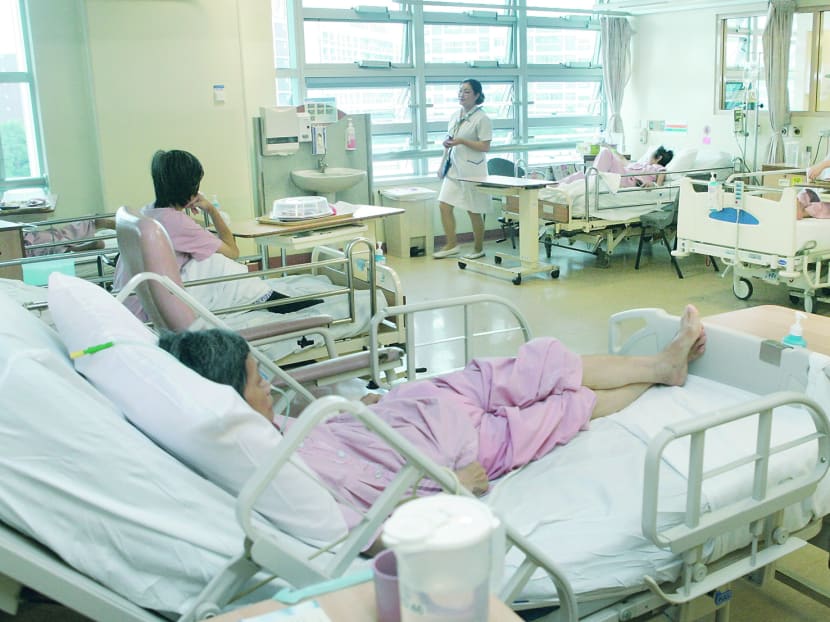Healthcare spending to hit S$12 billion by 2020: Tharman
SINGAPORE — Healthcare financing will be a key fiscal challenge for Singapore, said Finance Minister Tharman Shanmugaratnam, as he wrapped up the Budget debate in Parliament today (March 5).
SINGAPORE — Healthcare financing will be a key fiscal challenge for Singapore, said Finance Minister Tharman Shanmugaratnam, as he wrapped up the Budget debate in Parliament today (March 5).
The Government’s projected healthcare spending is expected to triple to S$12 billion a year by 2020, up from S$4 billion in 2011. Healthcare spending, he said, will reach S$8 billion next year — a year earlier than what had initially been projected.
Mr Tharman said the Government has been making significant shifts as the population ages.
To put things in perspective, he pointed out that the Pioneer Generation Package is for 450,000 Singaporeans. In contrast, there are a million Singaporeans between the ages of 45 and 64, who will reach retirement age in 10 to 20 years.
Mr Tharman, who is also Deputy Prime Minister, said the challenge is in how to provide quality healthcare in an affordable way.
He said there is no such thing as free and cheap healthcare system anywhere in the world, because the public ends up paying for it, either through taxes or hefty insurance premiums.
He added: “We will have to spend more on healthcare in future as our society goes up, as medical treatments that improve the quality of life become available, we’ll have to spend more.
“But we have to do it in a cost-effective way and prevent the total healthcare bill from spiralling upwards, because everyone will have to pay for that.”
Singapore’s strategy is to rebalance the structure of the healthcare system and to provide the right incentives for everyone — doctor, patient and insurer.
The next phase, said Mr Tharman, is to focus on primary and community care.
The Government is already moving in that direction, for example, by introducing the Community Health Assist Scheme and stepping up subsidies for intermediate and long-term care.
With healthcare spending expected to balloon, so too will the Government’s overall expenditure.
Mr Tharman said: “Beyond this term, it’s going to be different. Our revenues are not expected to increase as a percentage of GDP. In fact, revenue growth may moderate.
The asset market is likely to moderate, we’re not going to get the same amount of asset market based taxes as we’ve done in the last few years. Our foreign worker levy collection will also taper off as the foreign workforce growth slows down.
“So revenues are not going to increase as a percentage of GDP but spending will go up as a percentage of GDP.”
Addressing concerns expressed by several MPs on the government’s future fiscal position, Mr Tharman said the Government needs to balance its budget as spending goes up.
The Government’s expenditure is expected to go up by 3 percentage points of the GDP by 2030. The increase is not just because of social spending on healthcare and education, but also ramped-up infrastructure spending — this includes the expansion of rail lines across the island as well as the building of new flats and renewal of old ones
By 2020, two-thirds of HDB flats, or more than 630,000 units, will be 30 years or older.
Mr Tharman said Singapore will run into structural deficits if it does not raise its revenue.
He listed three principles guiding the Government — sustaining a vibrant economy, having a fair and equitable system of taxes and transfers, and keeping the tax burden of the average household and middle-income low.
He hinted at possible future initiatives to enhance taxes on assets, saying “we keep options open”, and noted that equity means that even though everyone pays taxes, the better off contribute more.
The needy, he said, receive more benefits than the taxes they pay.
Most Singaporeans do not pay income tax but they do pay the Goods and Services Tax (GST).
However, Mr Tharman said the Government gives out transfers such as Workfare, housing grants and GST vouchers that offset the GST. In fact, he said for every dollar of tax that the needy pays, “they get back at least S$5 in benefits, from childcare, all the way to retirement”.
He added: “Not every tax in a progressive system needs to be a progressive tax. In fact, that’s not an efficient system. Not every tax or benefit needs to be progressive but the system as a whole must (be progressive).” CHANNEL NEWSASIA







